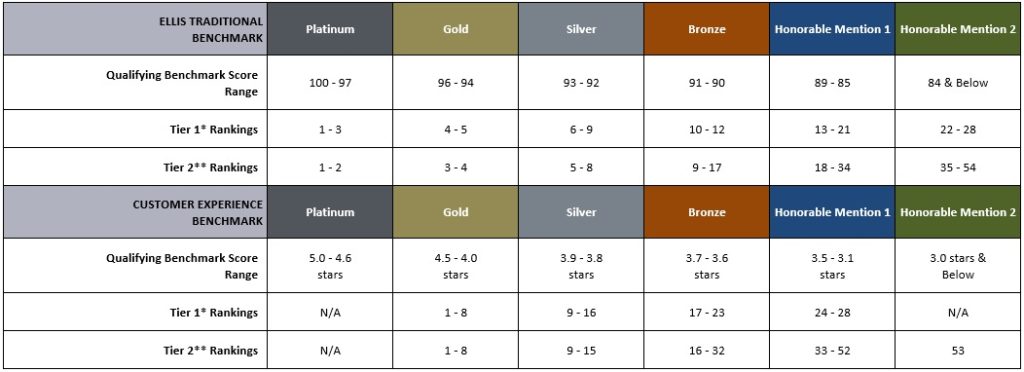Fourth Quarter 2017 Benchmark Results for Mystery Shops and Resident Surveys Executive Summary
Since 1984, Ellis, Partners in Management Solutions has specialized in helping the multifamily industry achieve their business goals by optimizing the customer experience at key touch points from initial visit to move-out through our Apartment Mystery Shops, Resident Surveys, and Training solutions. As we approach the year 2020, the ability to give external customers what they really need and want will depend on how well leaders do the same for their internal customer – the employee. Our mystery shops, resident surveys, and training are resources that can be used independently to address specific needs or together as a turnkey program for ongoing employee performance optimization.
We believe the more you know about your customers and what they have to say about your people and product, the better you can respond to their needs. By optimizing the customer experience at key touch points from initial visit to move-out through our Apartment Mystery Shops, Resident Surveys, and Training solutions, your employees will learn how to best respond. As a result, the more successful you will be at developing loyal customers who pay more, stay longer, and refer friends and family.
We conclude our letter series “Millennials: Identifying Missing Pieces in the Workplace” with a final focus on personal development opportunities at work. According to the Deloitte Millennial Survey, one third of Millennials would choose employee well-being, growth, and development as top priorities if they were in charge. In very short order, they will be in charge, so it is time to get ready. Join us as we explore this topic in our final letter of our 2017 series.
We thank you for joining us each quarter as we convey combined Benchmark results and sales trends and offer practical improvement ideas.
Fourth Quarter 2017 Benchmark: Overall Results
Mystery Shops
Ellis benchmarks mystery shop performance on the 10 key Benchmark questions and the Customer Experience. Companies can qualify for platinum, gold, silver, or bronze level based on their company’s overall Benchmark score for the quarter.
In 2016, the overall average Ellis Traditional Multifamily Industry Benchmark score across Ellis’ entire database of eligible shops1 was 85%, representing 41,894 shops, compared to 86% in the Fourth Quarter 2017, representing 10,511 shops. In 2016, the overall average Ellis Customer Experience Benchmark score was 3.5, versus 3.7 for the Fourth Quarter 2017.

* Tier 1 = 70 or more shops
** Tier 2 = 30-69 shops
Resident Surveys
The Ellis Loyalty Benchmark identifies and recognizes the customer experience performance of companies subscribed to the Ellis Resident Survey Program. It evaluates performance on 5 key touchpoints (lead conversion, move-in, maintenance, renewal, move-out) of the prospect and resident journey. The percentage of surveys responded to by the onsite team and the average number of days it took the team to respond are also measured, as these two factors impact the customer relationship and overall loyalty. Utilizing customer loyalty as a metric allows customer-centric companies the ability to forecast three specific customer behaviors: likelihood to convert/renew, willingness to pay more, and likelihood to recommend.
Effective First Quarter of 2017, Ellis changed the loyalty score to a scale of 0%–100% from a scale of -100%–100%. The change in scale is reflected in the scores for this quarter (see chart below):

The overall average Ellis Loyalty Benchmark in 2016 was 73%, compared to 75% for Fourth Quarter 2017. In 2016, the onsite response rate averaged 78%; Fourth Quarter 2017 reflects an increase to 86%. Teams took an average of 6.1 days to respond in Fourth Quarter 2017 versus an average of 7.8 days in 2016.

CONGRATULATIONS TO ELLIS BENCHMARK’S TOP PERFORMING COMPANIES FOURTH QUARTER 2017
Mystery Shops
Ellis Traditional Benchmark Platinum Level Achievers
Tier 1 (70 or more completed shops)
- Gables Residential Services
- Western National Property Management
- Windsor Property Management Co / GID
Tier 2 (30-69 completed shops)
- IMT Residential
- Legacy Partners Residential, Inc.
Ellis Customer Experience Benchmark Gold Level Achievers
Tier 1 (70 or more completed shops)
- AMLI Residential
- Cortland Partners
- CWS Apartment Homes, LLC
- Gables Residential Services
- Matrix Residential
- Mill Creek Residential Trust
- Olympus Property
- Windsor Property Management Co / GID
Tier 2 (30 – 69 completed shops)
- Carroll Management Group
- Irvine Company Apartment Communities
- Legacy Partners Residential, Inc.
- LMC, a Lennar Company
- Morgan Group
- The Carlyle Group
- Wood Partners
- ZRS Management, LLC
Resident Surveys
Ellis Best in Class Achievers
Tier 1 (1600 or more surveys received)
- Affinity Property Management
- Block Multifamily Group, LLC
- CWS Apartment Homes, LLC
- Guardian Management, LLC
- Lincoln Property Company
- LMC, a Lennar Company
- Manco Abbott
- Middleburg Management, LLC.
- Olympus Property
- Simpson Property Group
Tier 2 (1599 or fewer surveys received)
- Carlisle Property Management (CPM)
- Dranoff Properties
- HRI Properties
- Mack Urban Communities
- Reybold Venture Group
- Russo Development
- Sunrise Management
- Sunrise Management & Consulting
- The Buccini/Pollin Group, Inc.
*Companies are listed in alphabetical order
ELLIS’ FOURTH QUARTER 2017 BENCHMARK: QUESTION/TOUCHPOINT RESULTS
Mystery Shops
How did we do?
The chart below reflects the average Fourth Quarter 2017 score of Ellis’ entire database of eligible shops1 for each of the 10 key benchmark questions, the Customer Experience by category, and the combined overall Benchmark scores.


Resident Surveys
The chart below reflects the average scores across all Ellis Resident Survey companies for each survey touchpoint for Fourth Quarter 2017, and the combined overall loyalty score and average accountability performance results.

Millennials: Identifying Missing Pieces in the Workplace- Part IV
Our 2017 letter series has focused on “Millennials: Identifying Missing Pieces in the Workplace.” During the first three quarters we discussed: basic need, contribution, and feeling of belonging. Today, we tackle our final missing piece which is personal growth and development in the workplace. In 2017, ManPower Group conducted a survey of 19,000 working Millennials across 25 countries. Of those surveyed, 93% identified ongoing skills development as important to their future careers. How does this reality impact the multifamily industry? How can the multifamily industry best develop and reward a generation of employees who according to the Governance Studies at Brookings report How Millennials Could Upend Wall Street and Corporate America will comprise more than one of three adult Americans by 2020 and 75 percent of the workforce by 2025?
1. Reward the Willing Who Desire Growth and Achieve Success
The fact that many Millennial employees desire an opportunity to learn and grow is not news. While many are willing to put in the work, the disappointing reality is that not everyone gets promoted and/or rewarded monetarily. When Millennials feel their opportunity for professional and financial advancement is restricted, they are likely to seek alternate paths both inside and outside their company. This is a common scenario in the property management industry because of limited advancement opportunities in sought-after corporate level positions. Unfortunately, sometimes the easiest way for Millennial employees to get a raise in income and position is to resign their current job for a new one. With tools like Glassdoor, which gives transparency to the Millennial job search, it is easier than ever to see which companies pay more – or less – for a given job.
Our 2017 interviews with Millennials repeatedly revealed real-life examples of talented individuals who put in the hard work and long hours yet were not rewarded in their industry due to lack of tenure and experience despite the fact that they performed at and above expectations. When your budget hands are tied and the next position on the career ladder is not in sight, what can you do to develop, reward, encourage, and ultimately retain talented Millennial employees?
- Because Millennials are getting married and having children later than previous generations, relocation can be a highly desirable option to offer onsite employees. In a Cornerstone study, 77% of respondents revealed that they had considered relocation to another town, state or overseas as an exciting, positive career move. Property management companies who have a presence throughout the U.S. have a unique opportunity to speak to and feed those relocation desires. Those who are willing to cross state borders and work in a variety of markets will develop more rapidly than those who tend to remain on the same community year after year.
- A 2016 Deloitte study of Millennials found that 13.4% desire opportunities to progress in a leadership role. While property managers are in the best position to identify a leadership desire in their employees and utilize them with their onsite initiatives, it is not often their focus. Less than 2 percent of Millennials feel they have an employer or supervisor who encourages their professional growth, which creates a real opportunity for leaders to fill this gap. When it is realized, it is not uncommon that opportunities are given to a favored employee, the most tenured, or the “squeaky wheel”. Reid Hoffman, co-founder of LinkedIn and co-author of The Alliance, says, “Companies have long crafted personalized roles and career paths for their stars, yet it is possible – indeed necessary – to extend this personal approach to all employees.” Encourage your managers to seek out even the smallest of opportunities to develop and test the leadership of all team members.
- Another way to reward and grow employees that does not demand a promotion or salary increase is by developing midway steps and titles. Many Millennials are especially eager to advance in their careers and less willing to wait for the ‘five-year’ promotion. By developing midway steps and titles, managers can meet that desire for career progression while providing incremental training that will aid the employee later when career advancement opportunities are presented. It is a win-win situation.
Here is the icing on the cake for our industry. According to Intelligence Group, 64% of Millennials said they would rather make $40,000 a year at a job they love than $100,000 a year at a job they think is boring. When has property management ever been boring? While they might be willing to accept less in their paycheck, they will expect daily challenges.
2. Get “Real” with Personal Development
Search any job listing site and you will see the words “growth and development opportunity”. Many Millennials are biting the hook only to be disappointed when the company does not follow through on their promise. Are companies really failing on their promises or does it boil down to a misunderstanding of what personal development opportunities mean to the Millennial generation? Some Millennials will not be so bold as to ask how to advance in your company during the interview or onboarding process, but many will be thinking about it. How can you get real right from the start about development with your Millennial new hires?
- Start at the interview. What does “growth and development opportunity” really mean and who do they benefit? If they put in the necessary work, do you foresee opportunities for this new employee to promote in the next few years? If so, to what position(s)? Does your company have a history of developing and promoting from within? How long is the current promotion line to this particular position they have their eyes set on? Is your company progressive in their promotion practices, or do they only promote those who have “paid their dues” for 20+ years? The fact is that when you give false hope to your new hires, they will not trust you as much and will eventually end up leaving. During one of our Millennial interviews, the interviewee expressed their frustration at being overlooked for a promotion because of lack of seniority within the company. Rather than basing it on performance and success, it was a matter of date of hire. Seeing no room for growth, they decided they would soak up as much experience as they could while they were seeking new employment. Clarify all development goals and expectations at the interview.
- Provide real training that will lead employees to real promotions or give them a competitive edge. Training should lead employees somewhere. If not, they will not want to make the extra effort. Millennials thrive on growth and opportunity. They love to be mentored, and when matched with the right leader and teacher, the sky is the limit. With that said, they need to be given a career path to follow. If they do not know where they are going, they will make their own path right out your front door. Managers need to be honest, resourceful, and have a discussion of what the future can look like for them because they are the future! This generation is used to working as hard as they can in order to move onto the next thing, be it high school to college, college to grad school, or grad school to their first job. They have had much of their younger years mapped out for them and expect no different in their professional lives. Career pathing and proper training go hand in hand.
3. Make it Personal and Creative
Chris Boyce, CEO of Virgin Pulse, a software company that helps companies with memorable employee loyalty programs, believes, “Today’s worker is saying to managers, ‘Look, I’m happy to be flexible and work when necessary, but you need to in turn be helpful to me in my entire life, whether that’s helping me grow or simply get some sleep.’” How can you turn the value of that bonus or gift card into something much more memorable for your employees?
- Reward with an experience rather than a gift card. The whole one size fits all recognition from the corporate world does not resonate with Millennials. While the generic gift cards will always be appreciated, they have no emotional impact. It is important for managers to realize that their Millennial employees have a life outside of work. What are they passionate about? What are their hobbies? What is on their bucket list? Experiences leave memories, while gift cards end up with a zero balance. Consider asking employees for a “My Favorite Things and Biggest Dreams” list and use these as a launching pad when giving small or large rewards.
- Build value in relationships. Fortune Magazine has compiled a list of the 100 Best Workplaces for Millennials. The rankings were determined based on employee feedback based on 58 workplace qualities. Interestingly, the average Millennial’s top concerns in their workplace are sincerity of managerial support, transparent communication, ability to be themselves, and meaning received from their jobs. Nugget Markets, a grocery store, has made the list for 12 years. They employ 1,016 Millennials, who make up 65% of its total employee base. Why do Millennials love to work at Nugget Markets? They do not offer unlimited sick days, an on-site fitness center, discounted gym memberships, etc. Nonetheless, their employees believe they are the Disneyland of grocery stores. With a culture built on a positive, fun-loving team atmosphere, this family-owned grocery chain founded in 1926 believes that celebrations are an integral part of their culture, including everyday recognitions for jobs well done. Apparently, hugs, smiles, and high-fives are not uncommon between employees. The annual Fortune Magazine recognition is a testament to a company that during its 90-year history has never had a single layoff. Their people retain their people! Do your people retain your people?
According to Gallup, Millennials are 15% more likely to consider a different job opportunity than other generations and 36% of your Millennial employees plan on actively looking for a new job over the course of the next year as long as the general job market continues to improve. If you could earn a higher salary, grow your career, change locations more frequently, and find a better cultural fit from job hopping, I expect you would consider it, too. So, while opinions will vary on how to best approach each piece of the Millennial puzzle, the key takeaway is clear: they know what they want. If you want to attract and retain this powerhouse of talent, you need to know what they want, too. The future success of any business will be determined by how well they understand and speak to the needs of the Millennial workforce and customer.
We thank you for your ongoing participation and feedback, which help make this report informative, fresh, and a reliable resource. We hope you will find Ellis Partners in Management Solutions to be not only the finest source for mystery shopping and resident surveys but also a training resource for your organization. Additional support and information can be found on our website.
January 31, 2018
Prepared by Joanna Ellis, Chief Executive Officer and Francis Chow, Chief Strategic Officer
Footnotes: 1 See Ellis website for Benchmark eligibility, tier level, and recognition requirements for mystery shops and resident surveys. 2 No tier or rank is provided when minimum requirements are not met.

